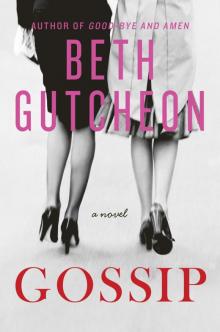- Home
- Beth Gutcheon
Leeway Cottage Page 11
Leeway Cottage Read online
Page 11
“Others lost much more,” says her father, and passes her the liver paste. “We’re a small country.”
“Hitler isn’t Bismarck,” says Nina.
“We’re still a small country,” says her father, and her mother touches Nina’s shoulder gently as she sets a last plate down on the table. She sits down across from Nina and meets her daughter’s unhappy eyes as she reaches to put a hand over her husband’s. We will not quarrel about this. The young are holy fools, she will tell Henrik later, in their room. They will know that themselves someday, but when they do, they’ll be our age and we’ll be dead. Henrik, soothed by his after-dinner pipe, already agrees with her. They will not quarrel with the children about this, although there will be times of division ahead; harmony and contentment are precious and they will need their creature comforts.
On April 22, 1940, a Monday, Annabelle Sydney Brant and Laurus Moss were married in New York City, at the Municipal Building across from City Hall. Many years later, recapturing the day (as well as he ever could), Laurus would remember only a feeling of unbearable homesickness and impotence, an inchoate sense that he had to do something. This was something he could do. Eric and Gudrun were their witnesses, and took them afterward for a wedding lunch at a place near the courthouse with candles in Chianti bottles on checked tablecloths. Laurus made a courtly toast to his bride. Eric claimed to feel like Cousin Feenix in Dombey and Son, who is so proud to be a witness at a wedding that he “puts his noble name into a wrong place, and enrols himself as having been born that morning.”
Laurus wrote a full account of the day to his family, telling them that they would all share the joy of it when they were together again. He said they were going to love Sydney, and she them. It had been very strange to stand in a dingy room in New York City and pledge to honor and protect a woman his family didn’t even know. He had always thought that when he married, Kaj would be his best man. That little Nina, with her big wide-set eyes, would be standing beside his bride, holding her flowers. Putting this expectation aside proved more disorienting than he had thought it could be.
In the evening, at Laurus’s urging, Sydney called her mother.
“She’s just going out for dinner,” said Maudie, “do you want me to catch her?”
“Please, Maudie.”
When Candace came on the line, she said, “Yes, dear?,” instead of hello, indicating she had time for about one sentence.
“I wanted to tell you that Laurus and I were married this morning.”
There was a silence. Then, “Well, dear. I wish you every happiness.” She sounded as if she’d just bitten into a quince. Oh, of course. Of course, Sydney thought. This doesn’t mean a fine man loves your daughter, it means you didn’t get to plan the wedding. “Would you like to speak to Laurus?” she asked, and handed the phone to him.
“Hello, Mother Brant,” he said pleasantly.
“Hello, Laurus. I understand congratulations are in order.”
“Thank you very much. I wanted to tell you I mean to take very good care of your daughter.”
“I’m sure you do. Congratulations. Thank you so much for calling. This is very exciting but I’m afraid I must run.”
For a wedding present she sent them Annabelle Brant’s six-hundred-piece monogrammed silver service. It was Victorian, not Candace’s taste; she ordered a new service in a moderne design from Tiffany for herself. She also sent Sydney a letter, saying she must explain to Laurus that he could not call her “Mother.” She said she was sorry to have to be that way, but it made her sick to her stomach.
The war news grew worse and worse as the spring progressed, until the Germans reached the English Channel and the British forces had to be taken off the mainland from the beach at Dunkirk, France, and carried to safety in workboats and pleasure boats. In the pictures in Life magazine, the escape fleet looked more like vessels for an oddly sorted yacht club cruise than a military flotilla. Holland and Belgium surrendered, France was invaded, and by mid-June, the Nazis were in Paris.
Paris. Which Sydney had still never seen and now maybe never would. Who knew what would happen to it now?
In July, Gladys McClintock and her handsome Californian, Neville Crane, were married in Dundee by the Reverend Davidson in the living room at Leeway Cottage. Happiness shone from these two, both so young and kind and hopeful as they said their vows before the fireplace, between two large potted palms. Laurus played Bach, a transcription of “Sheep May Safely Graze,” on the McClintocks’ grand piano before the ceremony and a Schubert impromptu after. Sydney and Elise Maitland gave a reception for them at the Country Club. The McClintocks’ finances had never recovered from the punishment of the Depression, and Mrs. McClintock hadn’t been well. Sydney, the old hand at marriage, was everywhere at the reception, in and out of the kitchen, directing how the food should be presented, and where Glad and Neville should stand to receive, and where the flowers should be and when to cut the cake. She had made a wonderful discovery: if you’re busy running things you don’t have to stop and be civil to anyone you don’t want to, like your mother.
The party was a great success. There was dancing to a gramophone, and a wedding cake baked by the Maitlands’ cook, covered in coconut, Gladdy’s favorite. When the champagne was poured, Dr. McClintock offered a toast to Neville. “I’d thought the expression about gaining a son was just politeness, but today it states exactly what we feel,” he said. Neville stood very straight with tears in his eyes, and Mrs. McClintock smiled her gentle smile and put her hand to her heart, meaning that her husband spoke for both of them. Gladdy toasted her parents for all their love for her all her life, and her friends Elise and Sydney for the beautiful party. Then Neville thrilled everyone by going to the piano. He played and sang in a warm sweet baritone to a hushed room. I’ll be loving you always. With a love that’s true, always. “Not for just an hour, not for just a day, not for just a year, but always,” he sang, with his eyes on his bride’s. Then he stood and raised his glass to her, and all over the room, people cheered and wiped their eyes and blew their noses.
“Who’d have thought it,” Elise whispered to Sydney. “The Prince of Princeton, and he has the sense to choose plain little Gladdy.” Elise looked as proud of Gladdy as if she were the mother of the bride. Sydney was trying impatiently to catch the maid’s eye; they were supposed to be pouring more champagne.
Candace came late and left early. While she was there she stayed quietly at the edge of things, watching her daughter, the happy wife, the gracious hostess, bustle about. She had that silly Mr. Christie with her again.
THE LEEWAY COTTAGE GUEST BOOK
July 20, 1940
Saturday. Gladdy and Neville Crane were married here today. A cold day but it went without a hitch. Molly feeling better and got through it well. Tom arrived last night and stays over Sunday. A happy event for our last summer here. Mr. and Mrs. Crane off to honeymoon at a secret location; drove out of town in Homer Gantry’s Model A. Everyone hopes they aren’t planning to go far.
That visit was as much as Sydney could stand of being under her mother’s roof that summer. She and Laurus spent the rest of it in New York, listening to the news of the Battle of Britain on the radio. Laurus was preparing for a concert tour of the Midwest in the fall and Sydney was furnishing their new apartment on Perry Street in the Village. It was a ground-level floor-through with a sunny front room for the grand piano Sydney gave Laurus for a wedding present, and had a tiny shade garden off the kitchen in back. Sydney was learning to cook, frikadeller and buttermilk soup and cauliflower in shrimp and dill sauce, recipes sent by Laurus’s mother, and meat loaf and applesauce from The Joy of Cooking. In the evenings, she and Laurus would sit outside after supper, grateful as cool air began to stir at last against their bare arms and the city recovered from the baking day. There were nights when it was too hot to sleep, when Sydney thought of cool fir-scented nights in Dundee, of fires on the beach and the stars seeming to curve so close overhead you could touch th
em. Laurus talked in the dark about his childhood summers in Nyborg, on the island of Fyn. The little house was right across a quiet road from the beach. You could see the sea from the little parlor, and upstairs there was one little bathroom, added long after the house was built. Each bedroom had a pitcher and basin for face washing and tooth brushing. For breakfast every morning they had a rich plate of clotted milk with bread crumbs and brown sugar on top—he could taste it, just thinking of it. He told her how the summer twilight would linger almost until midnight and then it was only full dark for a couple of hours. One slept much less, he said. It was too hard to say good night to the light; instead, you soaked the colors into all your cells to illuminate the dark season that was coming.
He pictured his mother, playing her beloved Brahms in the front room, watching the endless evening light making the sea a glittering mauve, shading to gray-black as night finally fell. He pictured his father, reading in the lamplight and smoking his pipe. Laurus could smell the sweet tobacco scent of his father kissing him good night when he was little.
It was August. Kaj would be working at the hospital in Copenhagen and Nina had a summer job in Jutland, taking care of some small children, but probably they got to Fyn for some weekends. Probably Aunt Tofa was there too, mending socks or knitting someone a jumper. After breakfast his mother and Aunt Tofa played four hands on the piano. It was a favorite morning sound, Aunt Tofa crying “Halt!” as she missed a trill or got tangled in her fingering, and the sound of the two sisters laughing.
And were there Germans in their pompous uniforms passing on the road outside? He didn’t want to picture it, but he did.
Denmark was too small, and had allowed itself to be swallowed too quietly, to garner much attention in the American news, and even if you could get them there was no point reading Danish papers, which were censored. But once in a while an intrepid traveler would bring Laurus a newspaper from Stockholm, or better yet, the anti- appeasement Handels-Och Sjöfartstidning from G?oteborg, which would carry Danish news. Apparently many Swedes expected that the Germans were going to win in the end, and were striving to like it. From Swedish accounts it seemed that most Danes, or very many, were thinking the same way. The papers did report that the Danes had perfected a technique called the “cold shoulder.” He pictured everyone, from the king to his gentle father, with his love of puns and his courtly manners, pretending not to see the Germans so they didn’t have to bow or nod. It hurt Laurus just to think about it. What must it cost to do it?
In November, Elise Maitland, in town for Thanksgiving, told Sydney and Laurus that Mrs. McClintock was dying. Neville and Glad had moved back to Philadelphia to be near her and to help Gladdy’s father.
The life here is at an end, Professor McClintock wrote in the guest book, when he closed Leeway Cottage in September. He had to carry his wife to the car, when the time came to go home, and he knew she would never be back. Getting her home was like transporting a cracked egg. He had her wrapped and bolstered into the front seat, and with every mile he feared that some bump or curve taken too fast would break her open, and the creeping poisoned larvae that were hatching all over her insides would cascade out loose in the car. When he got home, he wrote to Gertrude Abbott, the town realtor, to put Leeway on the market. That was like a death before the death. The McClintocks had hoped their grandchildren would grow up there. But they couldn’t afford the house and the illness too, and the children could not yet afford to take it over. Neville Crane was just starting architecture school and neither Gladys nor her brother, Tom, had any money of their own.
But it’s an ill wind that blows nobody good. Sydney Brant Moss had never had an unhappy moment at Leeway Cottage. When they heard that the house was for sale, she barely stopped to talk it over with Laurus before she bought it.
THE LEEWAY COTTAGE GUEST BOOK
July 10, 1941. Thursday
A new life here begins, wrote Sydney ceremoniously. She had green ink in her pen to mark the change from Dr. McClintock’s desolate last entry. We stopped on the way to drive up Mt. Washington. The summit was in clouds. Laurus drove up, and I drove down. Made the rest of the trip in sunlight. The house looks perfect. Just the same. Portia and Ellen left the supper on the stove; hash and green beans and strawberry pie for dessert. Lovely to be here.
In fact, it was thoroughly strange to be there, not as a child and a guest of the house but as the mistress of it. As was the custom in the summer colony, the house had changed hands with all of its furnishings, in fact with virtually all of its contents. No one in the McClintock family had been able to bear to go in to harvest personal belongings. The McClintocks’ sheets were on the beds. Their books were on the shelves, their games in the sea chests and window seats. Tommy McClintock’s red and black plaid lumber jacket hung in the downstairs closet. He had worn that jacket all the summer that he was in love with Elise Maitland, and Sydney was in love with him. There were old slickers in various sizes with the yellow rubber flaking off, a dozen tennis rackets, untold pairs of sneakers, and a Cornell letter sweater of Dr. McClintock’s that Gladdy used to wear. Even Portia and Ellen Chatto, sisters who had “done” for the McClintocks for years, had chosen to stay on at Leeway.
Mrs. McClintock had died in the spring. Her monogrammed towels were in the bathrooms, and a cardigan sweater Sydney had seen her wear a hundred times lay folded on a shelf in the bedroom closet. When Sydney lifted it down there was a whisper of her scent, something like lemon verbena. A rumpled handkerchief was in the pocket. Her most intimate things, underwear and so forth, had been removed by Portia, but there were cast-off bits of her outer shell everywhere. She had been the kind of mother who extended her cheerful love to shelter any number of young friends of her children or children of her friends, who found their way to her eaves and porches like starving birds in the snow to a cache of suet and sunflower seeds.
Sydney realized as she walked through the rooms of Leeway that her own mother had never been able to stand Molly McClintock. How interesting that she hadn’t seen that until now, from here. Candace, with her jewels and her servants and her big bazoom, had been jealous of the dumpy impecunious professor’s wife who had loved so many people.
Sydney was standing in the big front bedroom, Dr. and Mrs. McClintock’s room, with the four-poster double bed (no Hays Office twin beds here) and the sleeping porch beyond. From downstairs she heard Laurus begin to play the piano. It was the Romanze of Brahms; she’d never heard him play it before, though she had tried it herself, at least the easy part in F major. Sydney stood listening, looking down the lawn and over the trees to the wide blue water. Her heart was full. To live in such peace and beauty, and with such music!
Laurus looked up as he was finishing the piece to see his wife standing in the doorway of the great room. The fading light was behind her, outlining her strong figure, her dark hair half falling down from where she had pinned it.
He got up. “Tomorrow, the piano tuner. What are you smiling at?”
“I just realized,” she said. “This is what it feels like to have a happy family.”
Nineteen forty-one was Laurus’s first full summer in Dundee. He made the village his own as if overnight. He taught piano at Ischl Hall, coached a chamber group, and performed at concerts on Sunday afternoons. He soon had friends among the musicians and among the music lovers. But he equally relished the local men he met in the post office or at the garage, taciturn men with droll wits and immense competence in the physical universe. His proudest moment in the summer was the day Kermit Horton asked him to join the volunteer fire department.
Knowing Laurus would be busy at the hall much of the time, Sydney had pledged to herself that she would spend the summer working on her keyboard skills and practicing new repertoire. If she didn’t begin to prepare another recital, Madame Dumitrescu was going to stop taking her seriously. But as the days unfolded so did another, as yet unsuspected, aspect of her personality, like a ball of paper, crumpled under kindling, that suddenly opens u
p and spreads itself when it catches fire.
She owned a house! It was hers! She could do whatever she wanted to it! She could care for it and alter it, change its shapes and colors, and every single thing she did would say to people, This is what Sydney is like, This is what Sydney likes, This is what Sydney can do! When she walked into the den and looked at the wallpaper, really looked at it, she could barely restrain herself from peeling it off. She pictured clean paint, a pale blue, for this room, with white on all the moldings. She’d go into the kitchen looking for a palette knife or spatula with which to start prying off wallpaper, and become transfixed, planning how much better this room would look if you took out the wall dividing the pantry from the kitchen and moved the stove over there, and then…
She spent so much time at the hardware store and the lumberyard that she was on a first-name basis with all the clerks. She bought drop cloths and paint buckets, brushes and hammers, putty knives and sandpaper. She was often seen downtown wearing painter’s overalls with scrapers and rags sticking out of her many pockets, and her hair in a bandana. Sydney, talking on the street corner with this or that tradesman, quizzing Mutt Dodge about how to strip the paint off a door or Maynard Pease about how to fix the sink in the powder room. The first time she was discovered in this happy occupation by her mother, who was walking with Mr. Christie from the post office to Abbott’s grocery (about the longest distance Mr. Christie was willing to travel on foot), all her mother could say to her was, “Oh, for heaven’s sake.”
As for Laurus, the more Dundee felt like home, the more he saw Germans all over it. His body was in America, and he was too polite to impose his own preoccupations on others, but as he came and went in this peaceful village, he never ceased to be a man whose homeland had been invaded.

 The Affliction
The Affliction Dead at Breakfast
Dead at Breakfast Good-bye and Amen
Good-bye and Amen Leeway Cottage
Leeway Cottage Gossip
Gossip Saying Grace
Saying Grace